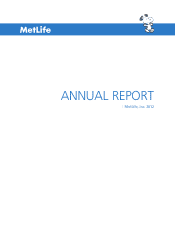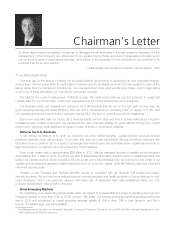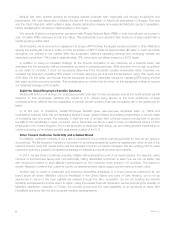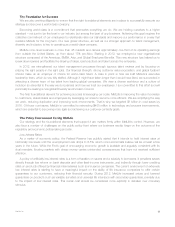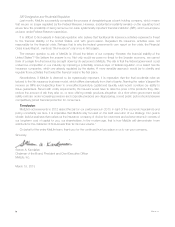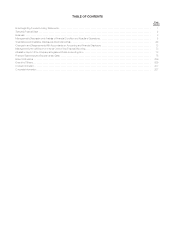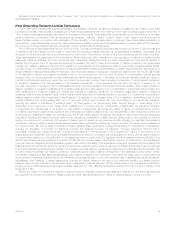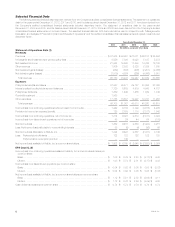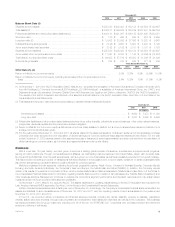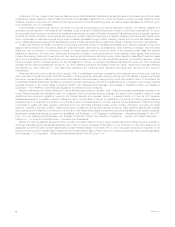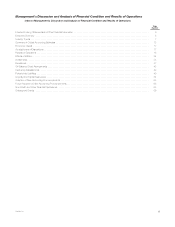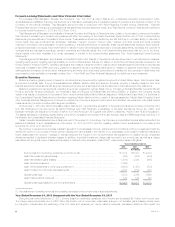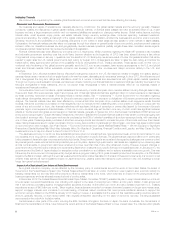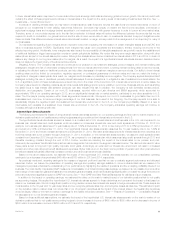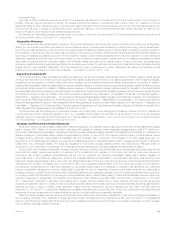MetLife 2012 Annual Report Download - page 7
Download and view the complete annual report
Please find page 7 of the 2012 MetLife annual report below. You can navigate through the pages in the report by either clicking on the pages listed below, or by using the keyword search tool below to find specific information within the annual report.As used in this Annual Report, “MetLife,” the “Company,” “we,” “our” and “us” refer to MetLife, Inc., a Delaware corporation incorporated in 1999, its
subsidiaries and affiliates.
Note Regarding Forward-Looking Statements
This Annual Report, including Management’s Discussion and Analysis of Financial Condition and Results of Operations, may contain or incorporate
by reference information that includes or is based upon forward-looking statements within the meaning of the Private Securities Litigation Reform Act of
1995. Forward-looking statements give expectations or forecasts of future events. These statements can be identified by the fact that they do not relate
strictly to historical or current facts. They use words such as “anticipate,” “estimate,” “expect,” “project,” “intend,” “plan,” “believe” and other words and
terms of similar meaning in connection with a discussion of future operating or financial performance. In particular, these include statements relating to
future actions, prospective services or products, future performance or results of current and anticipated services or products, sales efforts, expenses,
the outcome of contingencies such as legal proceedings, trends in operations and financial results.
Any or all forward-looking statements may turn out to be wrong. They can be affected by inaccurate assumptions or by known or unknown risks and
uncertainties. Many such factors will be important in determining the actual future results of MetLife, Inc., its subsidiaries and affiliates. These statements
are based on current expectations and the current economic environment. They involve a number of risks and uncertainties that are difficult to predict.
These statements are not guarantees of future performance. Actual results could differ materially from those expressed or implied in the forward-looking
statements. Risks, uncertainties, and other factors that might cause such differences include the risks, uncertainties and other factors identified in
MetLife, Inc.’s filings with the U.S. Securities and Exchange Commission (the “SEC”). These factors include: (1) difficult conditions in the global capital
markets; (2) increased volatility and disruption of the capital and credit markets, which may affect our ability to meet liquidity needs and access capital,
including through our credit facilities, generate fee income and market-related revenue and finance statutory reserve requirements and may requireusto
pledge collateral or make payments related to declines in value of specified assets; (3) exposure to financial and capital market risk, including as a result
of the disruption in Europe and possible withdrawal of one or more countries from the Euro zone; (4) impact of comprehensive financial services
regulation reform on us, as a potential non-bank systemically important financial institution, or otherwise; (5) numerous rulemaking initiatives required or
permitted by Dodd-Frank which may impact how we conduct our business, including those compelling the liquidation of certain financial institutions;
(6) regulatory, legislative or tax changes relating to our insurance, international, or other operations that may affect the cost of, or demand for, our
products or services, or increase the cost or administrative burdens of providing benefits to employees; (7) adverse results or other consequences from
litigation, arbitration or regulatory investigations; (8) potential liquidity and other risks resulting from our participation in a securities lending program and
other transactions; (9) investment losses and defaults, and changes to investment valuations; (10) changes in assumptions related to investment
valuations, deferred policy acquisition costs, deferred sales inducements, value of business acquired or goodwill; (11) impairments of goodwill and
realized losses or market value impairments to illiquid assets; (12) defaults on our mortgage loans; (13) the defaults or deteriorating credit of other
financial institutions that could adversely affect us; (14) economic, political, legal, currency and other risks relating to our international operations,
including with respect to fluctuations of exchange rates; (15) downgrades in our claims paying ability, financial strength or credit ratings; (16) a
deterioration in the experience of the “closed block” established in connection with the reorganization of Metropolitan Life Insurance Company;
(17) availability and effectiveness of reinsurance or indemnification arrangements, as well as any default or failure of counterparties to perform;
(18) differences between actual claims experience and underwriting and reserving assumptions; (19) ineffectiveness of risk management policies and
procedures; (20) catastrophe losses; (21) increasing cost and limited market capacity for statutory life insurance reserve financings; (22) heightened
competition, including with respect to pricing, entry of new competitors, consolidation of distributors, the development of new products by new and
existing competitors, and for personnel; (23) exposure to losses related to variable annuity guarantee benefits, including from significant and sustained
downturns or extreme volatility in equity markets, reduced interest rates, unanticipated policyholder behavior, mortality or longevity, and the adjustment
for nonperformance risk; (24) our ability to address unforeseen liabilities, asset impairments, or rating actions arising from acquisitions or dispositions,
including our acquisition of American Life Insurance Company and Delaware American Life Insurance Company (collectively, “ALICO”) and to
successfully integrate and manage the growth of acquired businesses with minimal disruption; (25) uncertainty with respect to the outcome of the
closing agreement entered into with the United States Internal Revenue Service in connection with the acquisition of ALICO; (26) the dilutive impact on
our stockholders resulting from the settlement of our outstanding common equity units; (27) regulatory and other restrictions affecting MetLife, Inc.’s
ability to pay dividends and repurchase common stock; (28) MetLife, Inc.’s primary reliance, as a holding company, on dividends from its subsidiariesto
meet debt payment obligations and the applicable regulatory restrictions on the ability of the subsidiaries to pay such dividends; (29) the possibility that
MetLife’s Board of Directors may control the outcome of stockholder votes through the voting provisions of the MetLife Policyholder Trust; (30) changes
in accounting standards, practices and/or policies; (31) increased expenses relating to pension and postretirement benefit plans, as well as health care
and other employee benefits; (32) inability to protect our intellectual property rights or claims of infringement of the intellectual property rights of others;
(33) inability to attract and retain sales representatives; (34) provisions of laws and our incorporation documents may delay, deter or prevent takeovers
and corporate combinations involving MetLife; (35) the effects of business disruption or economic contraction due to disasters such as terrorist attacks,
cyberattacks, other hostilities, or natural catastrophes, including any related impact on the value of our investment portfolio, our disaster recovery
systems, cyber- or other information security systems and management continuity planning; (36) the effectiveness of our programs and practices in
avoiding giving our associates incentives to take excessive risks; and (37) other risks and uncertainties described from time to time in MetLife, Inc.’s
filings with the SEC.
MetLife, Inc. does not undertake any obligation to publicly correct or update any forward-looking statement if MetLife, Inc. later becomes aware that
such statement is not likely to be achieved. Please consult any further disclosures MetLife, Inc. makes on related subjects in reports to the SEC.
MetLife, Inc. 1

